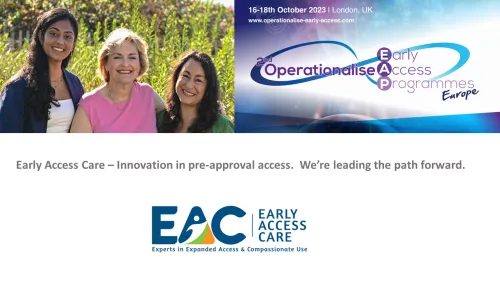Innovation in Pre-Approval Access - The Evolution of Data

This week over 120 early access experts, patient advocates, pharma companies and service providers are convening to share information on innovation in pre-approval access. Alita Hassan, Vice President of Early Access Care, is an expert in early access bringing innovation to this space. She’ll be sharing some of our experience in data evolution in early access programs. Exchanging information amongst this group is the beginning for all of us to innovate in pre-approval access. I’ve been attending these conferences for 10 years. There has been a positive motion forward with information exchange and knowledge sharing. Experience breeds best practice and collaborating in this type of conference allows us to bring medicines to patients and also value to the pharmaceutical company.
It's a new era for early access programs. While these programs are primarily in oncology and neurologic conditions, there is a broader opportunity for investigational medicines stretching beyond these traditional therapeutic areas. The evolution of most programs moves from phase 2 development, once the safety profile has somewhat been characterized and dosing guidance is established, to the point where the programs are a well-designed bridge from market authorization through the completion of pricing and reimbursement in a respective country. Each program varies – from an oncology program where RECIST, ECOG, dosing cycles and AE/AESI are collected, to a simple named patient program with only exposure and safety recorded. Needs vary. Having spent my career in clinical development and being highly protective of the safety and well-being of patients, I know all too well the thorough planning and deliberation taking place at the pharmaceutical company before the decision to launch a program occurs. At the heart of every program, a pharmaceutical company is making a well-intentioned pledge to make its innovative product available to patients not eligible for clinical trials and where approved therapies have failed. When a decision is made to launch a program, it’s an important opportunity for pharmaceutical companies to consider the added value of collecting real world evidence data. How that’s done has been challenging for many pharma companies, especially if they approach it as a clinical trial. Even in clinical development, our protocols need to be scrutinized to ensure we are asking the right questions and collecting only relevant data. The same holds true in early access programs. Safety information evolves as an investigational drug moves from phase 2 to phase 3 and eventual approval. Data needs vary as well. This is especially true in early access programs where re-examination of the type of data being collected at different stages of a program are important.
This is the type of dialogue and thought exchanges we know will evolve during the upcoming conference. I’m excited about Alita Hassan's presentation on data evolution in early access programs, and the ensuing conversations. Taking a program from a few named patient requests per month for the treatment of a rare or ultra rare disease, to a full thriving program collecting data that will be used to support market authorizations, including FDA approval, speaks directly to the mission of Early Access Care. Serving patients with exceptional care, thoughtfully designed and executed programs, and innovative approaches to real world evidence collection – it’s our singular mission to early access for patients in need.
Early Access Care – Innovation in pre-approval access. We’re leading the path forward.